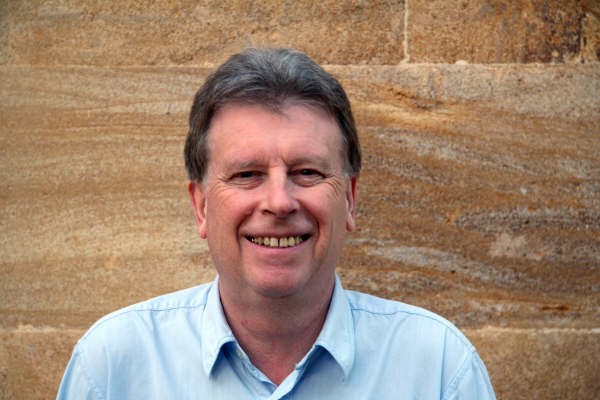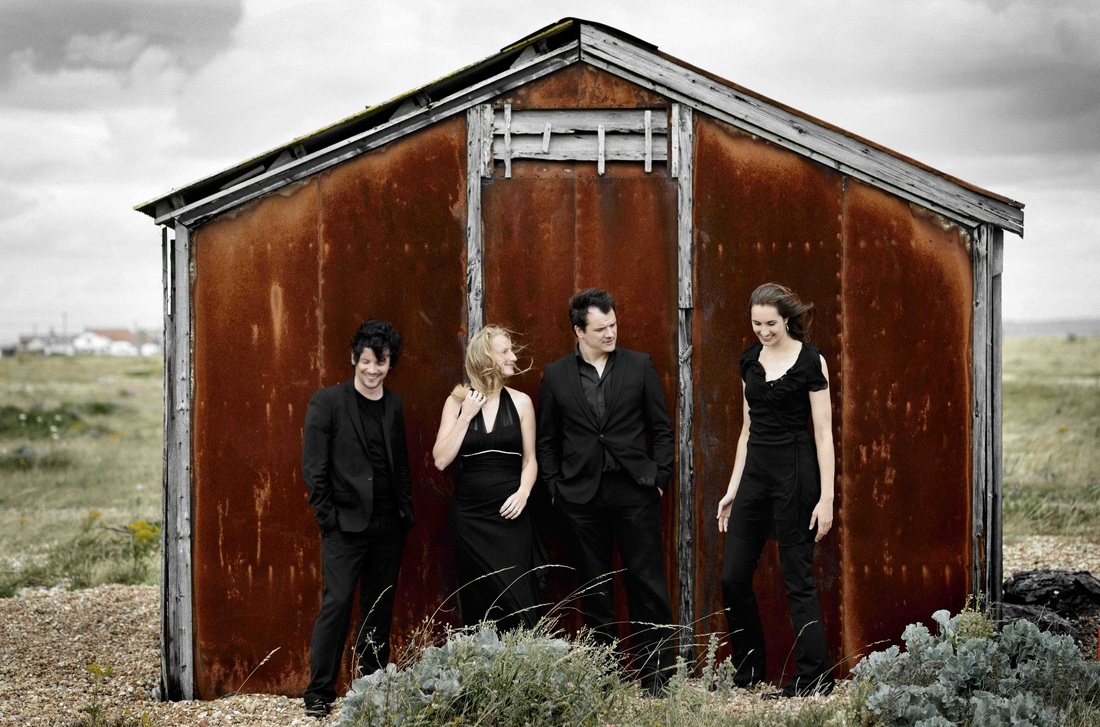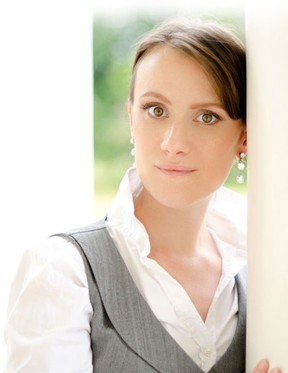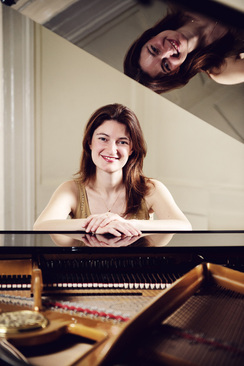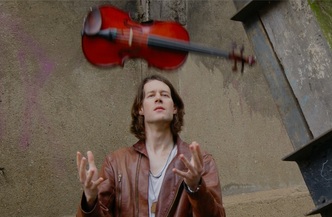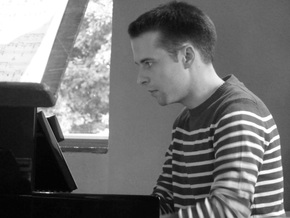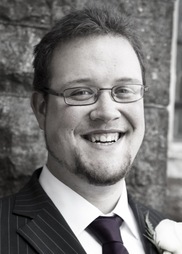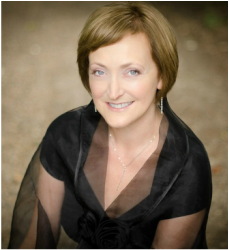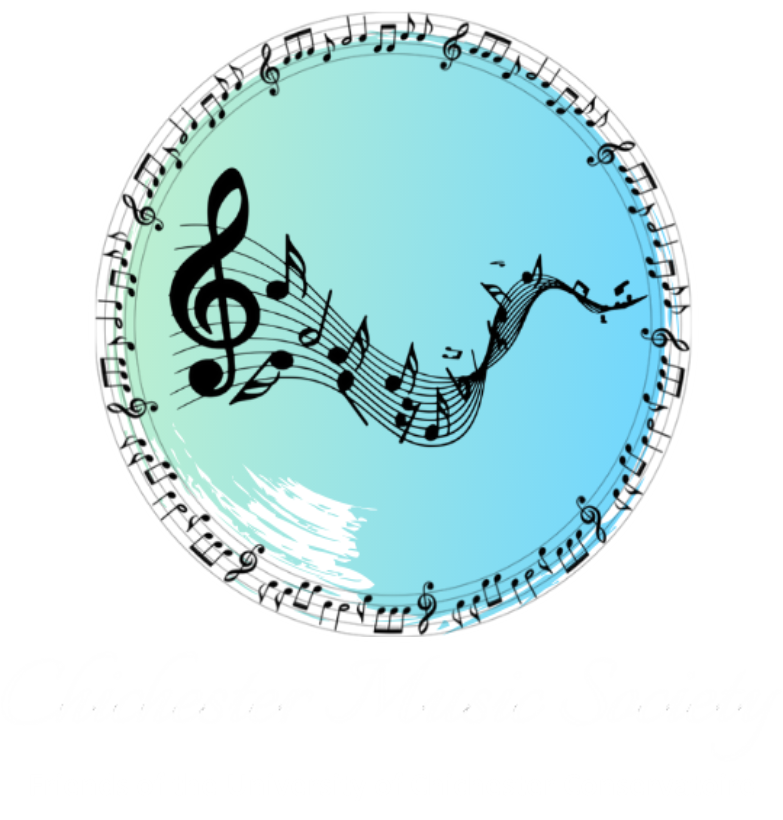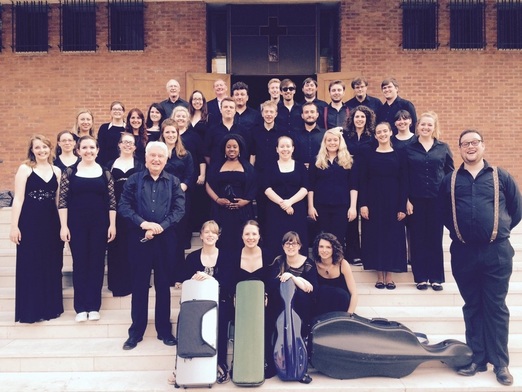
Christmas Concert
University of Chichester Chamber Choir, Conducted by Arthur Robson
At the Funtington Music Group’s Christmas Concert on 16 December at the University of Chichester, the University Chamber Choir performed a varied and delightful programme of Christmas music.
The programme was created by Arthur Robson, Director of Choral Studies, and Conductor and Compere for the evening, and it was balanced and wide-ranging, and included, not only traditional carols, but also medieval and 20th Century pieces.
The Choir, almost 30 strong, included some particularly able singers, and at least six, maybe more, were impressive soloists during the evening. There were many splendid and sophisticated choral performances, as well as a brilliant Poulenc piano solo by Robert Louden.
The quiet, understated and relaxed, yet compelling, conducting style of Arthur Robson, drew the best out of the Choir, who gave a sophisticated and impressive performance. Although, understandably, tradition played its part in many of the musical choices, there were also some interesting and newer scores and creative arrangements, such as the rendition of the Shepherd’s Carol.
The audience were also asked to participate throughout the evening in the singing of a number of traditional carols, such as Hark the Herald Angels Sing, and in this and a number of other carols the descant sung by the Choir was particularly effective.
The general effect was certainly also enhanced by the presence of some hearty singers amongst those attending. This was particularly so, when Emma Barnes was asked to teach the audience a new carol, which she did with particular enthusiasm, skill, and enterprise.
David Tinsley, Chairman of the Funtington Music Group said, “This was a concert where the sheer enjoyment of the Choir was intoxicating. The Choir’s musical accuracy, the melodic interest of the programme, and the beauty of their sound made an impressive and really enjoyable evening.”
University of Chichester Chamber Choir, Conducted by Arthur Robson
At the Funtington Music Group’s Christmas Concert on 16 December at the University of Chichester, the University Chamber Choir performed a varied and delightful programme of Christmas music.
The programme was created by Arthur Robson, Director of Choral Studies, and Conductor and Compere for the evening, and it was balanced and wide-ranging, and included, not only traditional carols, but also medieval and 20th Century pieces.
The Choir, almost 30 strong, included some particularly able singers, and at least six, maybe more, were impressive soloists during the evening. There were many splendid and sophisticated choral performances, as well as a brilliant Poulenc piano solo by Robert Louden.
The quiet, understated and relaxed, yet compelling, conducting style of Arthur Robson, drew the best out of the Choir, who gave a sophisticated and impressive performance. Although, understandably, tradition played its part in many of the musical choices, there were also some interesting and newer scores and creative arrangements, such as the rendition of the Shepherd’s Carol.
The audience were also asked to participate throughout the evening in the singing of a number of traditional carols, such as Hark the Herald Angels Sing, and in this and a number of other carols the descant sung by the Choir was particularly effective.
The general effect was certainly also enhanced by the presence of some hearty singers amongst those attending. This was particularly so, when Emma Barnes was asked to teach the audience a new carol, which she did with particular enthusiasm, skill, and enterprise.
David Tinsley, Chairman of the Funtington Music Group said, “This was a concert where the sheer enjoyment of the Choir was intoxicating. The Choir’s musical accuracy, the melodic interest of the programme, and the beauty of their sound made an impressive and really enjoyable evening.”
November
Terry Barfoot with the Navarra String Quartet
Terry Barfoot, with the renowned Navarra String Quartet, presented a fascinating evening about the life and works of Franz Joseph Haydn, ‘father’ of the string quartet. In the first half of the evening, Terry Barfoot gave us an introduction to Haydn’s string quartets, the musicians playing excerpts from some of Haydn’s key works. The second half of the evening was devoted to a complete performance of the Sunrise String Quartet in B flat major, Op. 76 No. 4
Terry explained that Haydn had continued to write string quartets throughout his years of employment with the Esterhazy family from 1761 until 1790, even though these compositions were not required in connection with his formal duties. He therefore did so because of the ‘creative rewards and possibilities’ that were clear to Haydn’s contemporaries, notably Mozart (who dedicated a set of wonderful quartets to him) and Beethoven. These were brought to life for us by Terry with selected movements played by the Navarra String Quartet.
Terry’s presentation was supported by a well chosen set of slides which put into context Haydn’s working environment and its key players, including the palaces he lived and worked in, and portraits of many of Haydn’s patrons. The Navarra String Quartet played excerpts from all the key periods of Haydn’s creative quartet writing. The movements were chosen to show Haydn’s stylistic and technical development of the quartet medium into “a partnership of equals”, and some of his musical fingerprints - his great intelligence, humanity, wonderful sense of humor and wit.
After the interval, the evening concluded with a detailed examination by Terry Barfoot of Haydn’s Sunrise Quartet, followed by a complete performance by the Navarra Quartet. The Sunrise nickname arises from the way in which the first violin’s melody at the very beginning unfolds so beautifully. The Navarra’s performance was wonderfully lyrical and full of light and shade. The second movement, a grave Adagio, began with a hushed, intense opening and as the movement developed, the interplay of the instruments, with the highly expressive first violin and cello, was superb. The minuet with its bucolic trio provided a perfect contrast, the players animated and rhythmical. The concluding Allegro ma non troppo was a treat, building superbly to the exultant final coda.
The appreciative audience responded with a warm and well-deserved extended ovation. David Tinsley, Chairman of the Funtington Music Group, thanked Terry Barfoot for his masterful and fascinating introduction and summed up by saying that “The Navarra are at the top of their game. Their integrated playing and fine ensemble are quite brilliant”. A wonderful evening for our final concert of the season!
Terry Barfoot with the Navarra String Quartet
Terry Barfoot, with the renowned Navarra String Quartet, presented a fascinating evening about the life and works of Franz Joseph Haydn, ‘father’ of the string quartet. In the first half of the evening, Terry Barfoot gave us an introduction to Haydn’s string quartets, the musicians playing excerpts from some of Haydn’s key works. The second half of the evening was devoted to a complete performance of the Sunrise String Quartet in B flat major, Op. 76 No. 4
Terry explained that Haydn had continued to write string quartets throughout his years of employment with the Esterhazy family from 1761 until 1790, even though these compositions were not required in connection with his formal duties. He therefore did so because of the ‘creative rewards and possibilities’ that were clear to Haydn’s contemporaries, notably Mozart (who dedicated a set of wonderful quartets to him) and Beethoven. These were brought to life for us by Terry with selected movements played by the Navarra String Quartet.
Terry’s presentation was supported by a well chosen set of slides which put into context Haydn’s working environment and its key players, including the palaces he lived and worked in, and portraits of many of Haydn’s patrons. The Navarra String Quartet played excerpts from all the key periods of Haydn’s creative quartet writing. The movements were chosen to show Haydn’s stylistic and technical development of the quartet medium into “a partnership of equals”, and some of his musical fingerprints - his great intelligence, humanity, wonderful sense of humor and wit.
After the interval, the evening concluded with a detailed examination by Terry Barfoot of Haydn’s Sunrise Quartet, followed by a complete performance by the Navarra Quartet. The Sunrise nickname arises from the way in which the first violin’s melody at the very beginning unfolds so beautifully. The Navarra’s performance was wonderfully lyrical and full of light and shade. The second movement, a grave Adagio, began with a hushed, intense opening and as the movement developed, the interplay of the instruments, with the highly expressive first violin and cello, was superb. The minuet with its bucolic trio provided a perfect contrast, the players animated and rhythmical. The concluding Allegro ma non troppo was a treat, building superbly to the exultant final coda.
The appreciative audience responded with a warm and well-deserved extended ovation. David Tinsley, Chairman of the Funtington Music Group, thanked Terry Barfoot for his masterful and fascinating introduction and summed up by saying that “The Navarra are at the top of their game. Their integrated playing and fine ensemble are quite brilliant”. A wonderful evening for our final concert of the season!
October
Ciara Hendrick & Emma Abbate
The autumn season of the Funtington Music Group continued with a marvellous concert from mezzo-soprano Ciara Hendrick accompanied by Emma Abbate on piano at the University of Chichester on 14 October.
The programme opened with a performance of Schumann’s Frauenliebe und Leben which Ciara Hendrick intuitively sang, with a voice that is technically assured and capable of expressing every nuance. She creatively performed this piece too, as if the desolate ending was implicit from the outset. Her rendition made for a psychologically convincing performance, immensely helped by her own dramatic involvement in the story. This was a deeply felt performance at the top level.
After some Vaughan Williams, the second half opened with an emotionally compelling interpretation by Emma Abbate of Brahms Intermezzo in A Major Opus 118 No 2. Her choice of piece was appropriate for this concert, and she had a genuine affinity with the composer’s musical phraseology.
With the return of Ciara Hendrick to the auditorium, the concert continued with Ravel’s Chants Populaires, and finally to Benjamin Britten’s Cabaret Songs. Ciara exquisitely performed the latter, employing just the right amount of ironic vocal interpretation that these pieces require. The accompaniment of Emma Abbate was absolutely right for this evening from subtle pianissimo in some sections of the programme, to, particularly at the end of Funeral Blues, where she employed some fiendish pyrotechnics on her piano to match the belting fortissimo from the mezzo-soprano. As David Tinsley said, “This was such a wonderful blend of voice and piano from two incredibly talented musicians. A truly memorable evening.”
Ciara Hendrick & Emma Abbate
The autumn season of the Funtington Music Group continued with a marvellous concert from mezzo-soprano Ciara Hendrick accompanied by Emma Abbate on piano at the University of Chichester on 14 October.
The programme opened with a performance of Schumann’s Frauenliebe und Leben which Ciara Hendrick intuitively sang, with a voice that is technically assured and capable of expressing every nuance. She creatively performed this piece too, as if the desolate ending was implicit from the outset. Her rendition made for a psychologically convincing performance, immensely helped by her own dramatic involvement in the story. This was a deeply felt performance at the top level.
After some Vaughan Williams, the second half opened with an emotionally compelling interpretation by Emma Abbate of Brahms Intermezzo in A Major Opus 118 No 2. Her choice of piece was appropriate for this concert, and she had a genuine affinity with the composer’s musical phraseology.
With the return of Ciara Hendrick to the auditorium, the concert continued with Ravel’s Chants Populaires, and finally to Benjamin Britten’s Cabaret Songs. Ciara exquisitely performed the latter, employing just the right amount of ironic vocal interpretation that these pieces require. The accompaniment of Emma Abbate was absolutely right for this evening from subtle pianissimo in some sections of the programme, to, particularly at the end of Funeral Blues, where she employed some fiendish pyrotechnics on her piano to match the belting fortissimo from the mezzo-soprano. As David Tinsley said, “This was such a wonderful blend of voice and piano from two incredibly talented musicians. A truly memorable evening.”
September
Thomas Gould & Robert Thomson
The young duo of Thomas Gould (violin) and Robert Thomson (piano) were the guests of Funtington Music Group on 9th September. We have had the pleasure of some notable performances in recent years, yet this surely ranked with the very best.
The evening began with the well-known Chaconne for solo violin by Bach. Essentially a solo instrument, the violin usually plays one note at a time, but Bach broke new ground by demanding that the player creates complex chord structures on several strings to accompany the melodies. From the start not only his technical skill, but also the joy that Thomas Gould clearly has in performing became apparent to us as he enchanted us with this most beautiful of pieces.
The next item was a sonata by Ravel. The composer declares in a note at the top of the piece that he considered the violin and piano to be essentially incompatible, and that one of the aims of the piece was to highlight this mismatch! Such an objective is unlikely to make comfortable listening, and at times the long soaring notes of the violin accompanied by short brittle chords on the piano were rather trying. However, the piece has humour, jazz influences and a triumphant finish which sent us to the interval with plenty to talk over.
The concert concluded with Beethoven’s masterpiece: the Kreutzer Sonata; sonata in name, but actually a monumental work of heroic proportions. Tremendous technical demands are made of both players, and they responded magnificently. So in command and in communication with each other were they that many delightful and subtle variations in time were brought out. This was an outstanding and moving performance of a great work, and the audience greeted it with acclaim.
Thomas Gould & Robert Thomson
The young duo of Thomas Gould (violin) and Robert Thomson (piano) were the guests of Funtington Music Group on 9th September. We have had the pleasure of some notable performances in recent years, yet this surely ranked with the very best.
The evening began with the well-known Chaconne for solo violin by Bach. Essentially a solo instrument, the violin usually plays one note at a time, but Bach broke new ground by demanding that the player creates complex chord structures on several strings to accompany the melodies. From the start not only his technical skill, but also the joy that Thomas Gould clearly has in performing became apparent to us as he enchanted us with this most beautiful of pieces.
The next item was a sonata by Ravel. The composer declares in a note at the top of the piece that he considered the violin and piano to be essentially incompatible, and that one of the aims of the piece was to highlight this mismatch! Such an objective is unlikely to make comfortable listening, and at times the long soaring notes of the violin accompanied by short brittle chords on the piano were rather trying. However, the piece has humour, jazz influences and a triumphant finish which sent us to the interval with plenty to talk over.
The concert concluded with Beethoven’s masterpiece: the Kreutzer Sonata; sonata in name, but actually a monumental work of heroic proportions. Tremendous technical demands are made of both players, and they responded magnificently. So in command and in communication with each other were they that many delightful and subtle variations in time were brought out. This was an outstanding and moving performance of a great work, and the audience greeted it with acclaim.
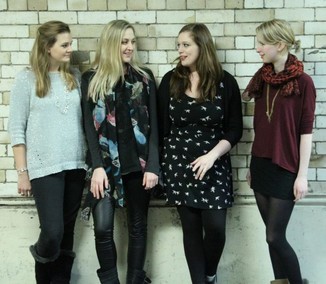
June
Holywell String Quartet
The Funtington Music Group welcomed back the Holywell String Quartet for their third visit to the Group, for their 2015 Summer Concert on 10 June. After enjoying an appetising cold buffet with the membership, the Holywell began their concert with a lively and polished performance of Mozart’s String Quartet in G Major K156. The Holywell ably portrayed this work with serenity and inner confidence, and particularly noteworthy was the joyous and inspired finale.
The Quartet moved onto Verdi’s String Quartet in E Minor, his only surviving non-vocal work. Unsurprisingly, as Sophie Lockett who introduced this piece explained, this quartet is grandly operatic full of soaring melodies, triumphant climaxes, all interspersed with lyrical interludes. After the demanding introduction, superbly interpreted, the Holywell effectively performed the whole work, which they obviously clearly enjoyed.
After a shortened interval, as time was at a premium, the Holywell played Beethoven’s String Quartet in E Flat Major Op 127. This was another superbly lyrical performance, with the obvious exception of the Scherzo, which was characteristically delivered with a jaunty crispness. Their playing of this tricky quartet was full of interpretation, passionate, natural and unforced. This was a performance to treasure.
The appreciative audience responded with a warm and well-deserved extended ovation. David Tinsley, Chairman of the Funtington Music Group, summed up by saying, “This quartet is at the top of their game. We have all been privileged to attend a really memorable evening.”
Holywell String Quartet
The Funtington Music Group welcomed back the Holywell String Quartet for their third visit to the Group, for their 2015 Summer Concert on 10 June. After enjoying an appetising cold buffet with the membership, the Holywell began their concert with a lively and polished performance of Mozart’s String Quartet in G Major K156. The Holywell ably portrayed this work with serenity and inner confidence, and particularly noteworthy was the joyous and inspired finale.
The Quartet moved onto Verdi’s String Quartet in E Minor, his only surviving non-vocal work. Unsurprisingly, as Sophie Lockett who introduced this piece explained, this quartet is grandly operatic full of soaring melodies, triumphant climaxes, all interspersed with lyrical interludes. After the demanding introduction, superbly interpreted, the Holywell effectively performed the whole work, which they obviously clearly enjoyed.
After a shortened interval, as time was at a premium, the Holywell played Beethoven’s String Quartet in E Flat Major Op 127. This was another superbly lyrical performance, with the obvious exception of the Scherzo, which was characteristically delivered with a jaunty crispness. Their playing of this tricky quartet was full of interpretation, passionate, natural and unforced. This was a performance to treasure.
The appreciative audience responded with a warm and well-deserved extended ovation. David Tinsley, Chairman of the Funtington Music Group, summed up by saying, “This quartet is at the top of their game. We have all been privileged to attend a really memorable evening.”
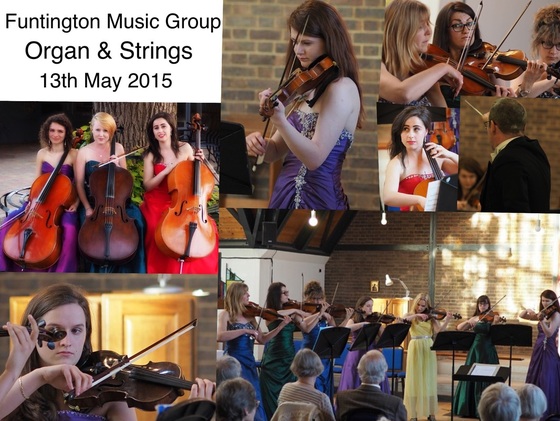
May
Organ and Strings – an Outstanding Evening
Staff and students from the University combined to provide Funtington Music Group with an instructive and entertaining evening on 13th May. Crispin Ward, Head of Orchestral Studies, spoke about the concerto past and present. Nowadays a concerto nearly always features a single soloist showing virtuosic skills in the company of a symphony orchestra. With the help of a group of student string players Crispin showed us that the form became popular in the 17th century with a small group of players from a larger band taking a prominent role in a piece; only later did the idea of a single soloist develop. To illustrate this, the orchestra played a concerto grosso by Handel, followed by a concerto for two cellos and orchestra by Vivaldi. At the end of the first half Julia Bishop talked to us about the difference between modern and baroque stringed instruments, particularly as the strings were made of gut, played with a smaller and lighter bow.
The second half was a complete contrast led by Ben Hall, the Head of Music at the University and also President of Funtington Music Group. He introduced us to the organ in the Chapel, explaining that it has been restored around the core of an old pipe organ, augmented with modern electronic stops built up from recordings of individual sounds from other famous organs, resulting in a flexible and high quality instrument. The concert ended with Ben as soloist in a performance of the Concerto for Organ, Strings and Timpani by Poulenc: a dramatic work in one movement featuring many abrupt changes of mood which put the new organ through its paces. It also places many demands on the young orchestra who showed great sensitivity of playing and enthusiasm for the music.
This was undoubtedly another outstanding evening for the Group.
Organ and Strings – an Outstanding Evening
Staff and students from the University combined to provide Funtington Music Group with an instructive and entertaining evening on 13th May. Crispin Ward, Head of Orchestral Studies, spoke about the concerto past and present. Nowadays a concerto nearly always features a single soloist showing virtuosic skills in the company of a symphony orchestra. With the help of a group of student string players Crispin showed us that the form became popular in the 17th century with a small group of players from a larger band taking a prominent role in a piece; only later did the idea of a single soloist develop. To illustrate this, the orchestra played a concerto grosso by Handel, followed by a concerto for two cellos and orchestra by Vivaldi. At the end of the first half Julia Bishop talked to us about the difference between modern and baroque stringed instruments, particularly as the strings were made of gut, played with a smaller and lighter bow.
The second half was a complete contrast led by Ben Hall, the Head of Music at the University and also President of Funtington Music Group. He introduced us to the organ in the Chapel, explaining that it has been restored around the core of an old pipe organ, augmented with modern electronic stops built up from recordings of individual sounds from other famous organs, resulting in a flexible and high quality instrument. The concert ended with Ben as soloist in a performance of the Concerto for Organ, Strings and Timpani by Poulenc: a dramatic work in one movement featuring many abrupt changes of mood which put the new organ through its paces. It also places many demands on the young orchestra who showed great sensitivity of playing and enthusiasm for the music.
This was undoubtedly another outstanding evening for the Group.
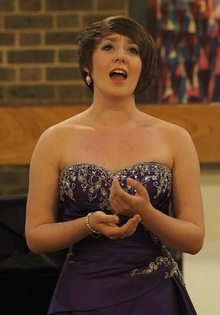 Erin Alexander
Erin Alexander
April
University Showcase Concert - Erin carries off the First Prize!
The twelfth annual University Student Showcase concert on 15th April demonstrated how many versatile and talented musicians were now studying for degrees in Chichester. For this event, over 30 aspiring applicants were auditioned for six places to perform before the discerning FMG audience, augmented by parents and student friends in the gallery.
Adjudicator Charles Harrison, Chichester Cathedral Organist and Choirmaster, had a most difficult task in selecting the winning order but all agreed that his summing up was masterly, insightful and most helpful to the performers in shaping their future careers on the platform.
Winner of the top prize of £500, soprano Erin Alexander, gave a most polished and varied presentation of works by Dvorak, Chabrier and Puccini which delighted the audience and impressed the adjudicator. Second prize of £250 went to Paula Santos for her skilful demonstration of French horn playing and the third prize of £100 was awarded to Rosie Vinter for a dynamic and dramatic performance on the University organ.
The runners up were Chloe Jordan, who charmed us with her pure mezzo soprano interpretation of songs she loved; modern jazz trio Decaswing who had the audience clicking their fingers and tapping their feet; and tenor Hubert Hill-Reid, whose acting of Leparello’s list of Don Giovanni’s female conquests rounded off a splendid evening of musical delights. Each of these performances received £50.
Vice-Chancellor Professor Clive Behagg said how proud he was of his students and thanked all concerned for their hard work in preparing for such a successful and enjoyable evening.
University Showcase Concert - Erin carries off the First Prize!
The twelfth annual University Student Showcase concert on 15th April demonstrated how many versatile and talented musicians were now studying for degrees in Chichester. For this event, over 30 aspiring applicants were auditioned for six places to perform before the discerning FMG audience, augmented by parents and student friends in the gallery.
Adjudicator Charles Harrison, Chichester Cathedral Organist and Choirmaster, had a most difficult task in selecting the winning order but all agreed that his summing up was masterly, insightful and most helpful to the performers in shaping their future careers on the platform.
Winner of the top prize of £500, soprano Erin Alexander, gave a most polished and varied presentation of works by Dvorak, Chabrier and Puccini which delighted the audience and impressed the adjudicator. Second prize of £250 went to Paula Santos for her skilful demonstration of French horn playing and the third prize of £100 was awarded to Rosie Vinter for a dynamic and dramatic performance on the University organ.
The runners up were Chloe Jordan, who charmed us with her pure mezzo soprano interpretation of songs she loved; modern jazz trio Decaswing who had the audience clicking their fingers and tapping their feet; and tenor Hubert Hill-Reid, whose acting of Leparello’s list of Don Giovanni’s female conquests rounded off a splendid evening of musical delights. Each of these performances received £50.
Vice-Chancellor Professor Clive Behagg said how proud he was of his students and thanked all concerned for their hard work in preparing for such a successful and enjoyable evening.
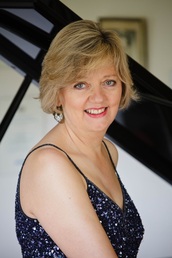
March
Angela Zanders - The Voice of the Piano
Angel Zanders, a member of the Music Department at the University of Chichester, was the guest at Funtington Music Group’s meeting on 11th March, in which we were treated to an illustrated lecture on the life and music of Frederic Chopin.
Like Mozart and Schubert, Chopin’s life was both short and full of difficulties, but so often adversity inspires great creativity. Angela showed us the strong feelings that Chopin always held for his native Poland, even though he left the country at 19, never to return. It was he who made famous the terms Polonaise, Mazurka and Nocturne: short piano works characterised by endearing melodic lines, often melancholy but always engaging.
With a blend of slides, audio clips and her own virtuoso illustrations on the magnificent Steinway, Angela gave us both an informative and thoroughly enjoyable evening of history and music. There are several concert societies in and around Chichester, but this wonderful evening illustrated to everyone present why the Funtington Music Group is special.
Angela Zanders - The Voice of the Piano
Angel Zanders, a member of the Music Department at the University of Chichester, was the guest at Funtington Music Group’s meeting on 11th March, in which we were treated to an illustrated lecture on the life and music of Frederic Chopin.
Like Mozart and Schubert, Chopin’s life was both short and full of difficulties, but so often adversity inspires great creativity. Angela showed us the strong feelings that Chopin always held for his native Poland, even though he left the country at 19, never to return. It was he who made famous the terms Polonaise, Mazurka and Nocturne: short piano works characterised by endearing melodic lines, often melancholy but always engaging.
With a blend of slides, audio clips and her own virtuoso illustrations on the magnificent Steinway, Angela gave us both an informative and thoroughly enjoyable evening of history and music. There are several concert societies in and around Chichester, but this wonderful evening illustrated to everyone present why the Funtington Music Group is special.
The Funtington Music Group welcomed on 11 February, Tom Robson and Susan Legg. Tom, recounted his life as a Professional Singer, and also sang, accompanied by Susan Legg, a number of songs, including a selection by Vaughan Williams and Benjamin Britten. Tom Robson was impressive with his clear rhythm, diction and often dynamic and authoritative singing. He was wonderfully expressive, and excelled with vocal colouring moving effortlessly, for instance, from gruffness, to quiet, melodious eloquence. Before the interval he was joined by the University of Chichester Chamber Choir for a performance of his own composition, Sing Lullaby, with Ruth Parsons as soloist.
After the interval the highlight was a performance of Poulenc’s Tel Jour, Telle Nuit. Throughout this performance there was tangible synergy between singer and accompanist Susan Legg. Tom Robson’s superb lyrical expression brought out both the playfulness of the music while maintaining the gravity of the composer’s intent.
David Tinsley, Chairman of the Funtington Music Group, said, “Such a magical voice, such fantastic sound, how does anyone produce such a wonderful performance? This was a superb evening from Tom Robson and Susan Legg, two very talented musicians.”
After the interval the highlight was a performance of Poulenc’s Tel Jour, Telle Nuit. Throughout this performance there was tangible synergy between singer and accompanist Susan Legg. Tom Robson’s superb lyrical expression brought out both the playfulness of the music while maintaining the gravity of the composer’s intent.
David Tinsley, Chairman of the Funtington Music Group, said, “Such a magical voice, such fantastic sound, how does anyone produce such a wonderful performance? This was a superb evening from Tom Robson and Susan Legg, two very talented musicians.”
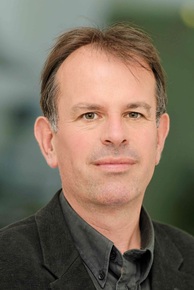
January - An Insight into Beethoven
Funtington Music Group’s guest on 14th January was Roy Stratford, who undertook the daunting task of helping us understand better the very difficult final compositions of Beethoven. A genius ahead of his time and in later life beset by deafness and social isolation, Beethoven’s later compositions are not easily accessible to the amateur listener, but Roy, clearly relishing his task, set about this formidable challenge with huge enthusiasm and energy.
One of the pleasures of Roy Stratford’s delivery is that he has a broad fund of knowledge which he shares with much humour, demonstrating his thoughts with illustrations from the keyboard. His main theme was the final three piano sonatas, and after the interval we were treated to a concert performance of Sonata in A flat major, Opus 110, and with the benefit of Roy’s wisdom in the first half, we were all able to understand the work a great deal better.
Funtington Music Group’s guest on 14th January was Roy Stratford, who undertook the daunting task of helping us understand better the very difficult final compositions of Beethoven. A genius ahead of his time and in later life beset by deafness and social isolation, Beethoven’s later compositions are not easily accessible to the amateur listener, but Roy, clearly relishing his task, set about this formidable challenge with huge enthusiasm and energy.
One of the pleasures of Roy Stratford’s delivery is that he has a broad fund of knowledge which he shares with much humour, demonstrating his thoughts with illustrations from the keyboard. His main theme was the final three piano sonatas, and after the interval we were treated to a concert performance of Sonata in A flat major, Opus 110, and with the benefit of Roy’s wisdom in the first half, we were all able to understand the work a great deal better.

